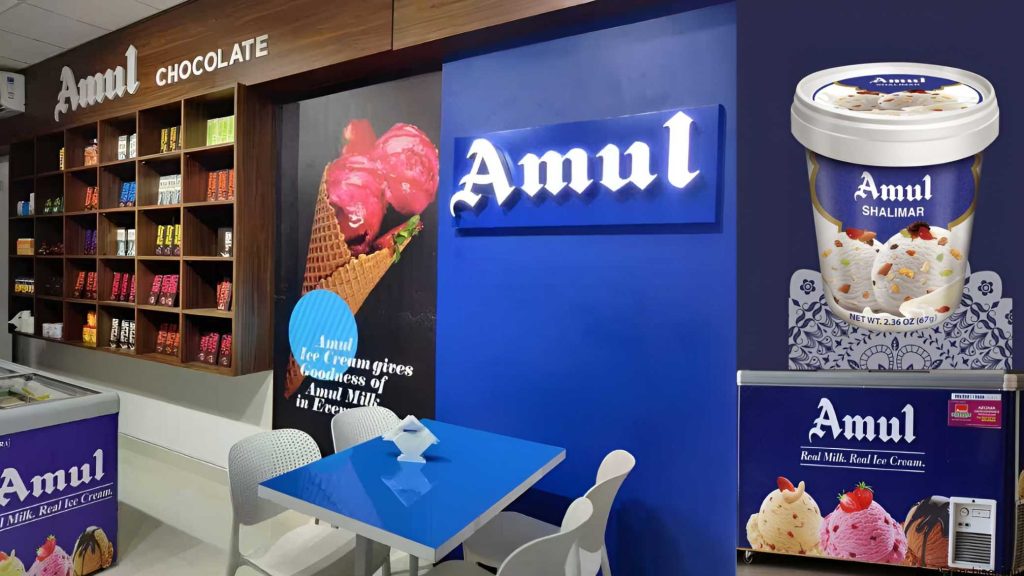Amul Ice Cream Franchise : Franchising has become one of the most powerful business models in India’s modern economy, and when it comes to the food and beverages industry, the opportunities are endless. Among all the players in this sector, Amul stands tall as a household name that every Indian trusts. Known as “The Taste of India,” Amul has built its reputation over decades and has ventured into multiple product lines including milk, cheese, butter, chocolates, beverages, and of course, ice cream. The Amul Ice Cream franchise has become a highly sought-after business opportunity, especially for entrepreneurs who want to invest in a brand that combines trust, quality, and profitability.
Table of Contents
In this comprehensive essay-style guide, we will explore everything you need to know about starting an Amul Ice Cream franchise in India. We will break down revenue sharing models, investment requirements, ROI tenure, benefits, challenges, and strategies to make the business profitable. For anyone aspiring to step into the food retail and quick service dessert market, this 2025-ready guide will serve as your ultimate reference.
The Power of the Amul Brand

Before analyzing the franchise model, it’s important to understand the legacy and credibility of Amul. Established in 1946, Amul has been the face of India’s White Revolution and remains the largest dairy brand in India. Managed by the Gujarat Cooperative Milk Marketing Federation (GCMMF), Amul represents not just a business, but a movement of farmers, innovation, and consumer trust.
The company entered the ice cream business in 1996 and quickly rose to become one of the largest ice cream brands in India. Unlike many competitors, Amul ice creams are made with 100% milk, ensuring purity, taste, and quality. This commitment has positioned Amul Ice Creams as a top choice across age groups and income levels.
For entrepreneurs, associating with a brand like Amul means starting a business that already enjoys massive customer loyalty, minimizing the risk of failure.
Also Read : How to Start Dolly Chaiwala Franchise ? – Comprehensive Guide 2025
Why Choose Amul Ice Cream Franchise in India?
The ice cream industry in India has witnessed tremendous growth, driven by urbanization, rising disposable incomes, and changing consumer preferences. Amul has tapped into this growing demand with its wide range of ice creams, sundaes, frozen desserts, and shakes.
Some reasons why starting an Amul Ice Cream franchise is a smart business choice:
- Trusted Brand Recognition – Customers associate Amul with quality and affordability.
- Diverse Product Portfolio – From kulfi and sundaes to sugar-free options, Amul caters to all age groups.
- Affordable Franchise Model – Compared to international brands, Amul franchises are more cost-effective.
- High Profit Potential – Ice cream has high margins, and Amul’s established distribution ensures availability and customer trust.
- Low Risk Investment – With decades of proven business operations, Amul provides stability to franchise partners.
Types of Amul Ice Cream Franchise Models

Amul offers different types of business models to suit various investor capacities and business goals. Entrepreneurs can choose from formats such as:
- Amul Preferred Outlet (APO): Retail outlets selling the complete Amul product range including dairy, beverages, and ice creams.
- Amul Ice Cream Scooping Parlour: Dedicated stores focused on serving scoops, sundaes, milkshakes, and ice cream-based desserts.
- Amul Café and Parlour Model: Larger format outlets offering an extended menu, targeting urban areas with higher footfall.
For this guide, we are focusing on the Amul Ice Cream Scooping Parlour model, as it directly caters to dessert lovers and is in high demand across India.
Investment Requirements for Amul Ice Cream Franchise
Starting an Amul Ice Cream franchise requires a well-planned investment, but it is relatively affordable compared to other international dessert brands. The typical investment breakdown includes:
- Non-Refundable Brand Security Deposit: Ranges from ₹25,000 to ₹50,000 depending on the store type.
- Interior Setup and Equipment: Around ₹4 to ₹6 lakhs for furniture, refrigeration units, display counters, branding, and ambiance creation.
- Initial Inventory Cost: ₹1 to ₹2 lakhs worth of stock to begin operations.
- Other Expenses: Staff salaries, rent deposits, licenses, and working capital.
On average, the total investment for an Amul Ice Cream franchise ranges from ₹6 lakhs to ₹10 lakhs, making it one of the most affordable and lucrative franchise options in the Indian F&B sector.
Revenue Sharing and Profit Margins
One of the biggest attractions of the Amul Ice Cream franchise is its favorable revenue-sharing and profit margin structure. Unlike many international brands that charge hefty royalties, Amul follows a cooperative-based approach and offers franchise owners excellent margins.
Typical margins include:
- Amul Ice Cream Packs (Retail): 20% to 25%
- Scoops and Sundaes Served in Parlour: 30% to 40%
- Beverages like Shakes and Amul Kool: 25% to 30%
This revenue-sharing model allows entrepreneurs to retain a significant portion of their earnings, making the franchise highly profitable. With the right location and marketing, monthly profits can be substantial.
ROI and Tenure for Amul Ice Cream Franchise
Return on Investment (ROI) is one of the most critical factors for franchise aspirants. With Amul’s low-cost entry and high-margin products, the payback period is relatively short.
- ROI Tenure: Most franchise partners achieve break-even within 18 to 24 months, depending on sales and operational efficiency.
- Franchise Agreement Tenure: Usually offered for 5 years with an option for renewal.
This short ROI tenure makes the Amul Ice Cream franchise highly attractive compared to other F&B businesses that take longer to recover investment.
Key Factors for Success in Amul Ice Cream Franchise
Running a successful Amul Ice Cream franchise requires more than just investment. Here are some factors that influence profitability and growth:
- Prime Location Selection: Outlets in malls, near schools, colleges, busy markets, and tourist spots attract higher footfall.
- Customer-Centric Service: Friendly staff and quick service enhance customer loyalty.
- Innovative Menu Additions: Introducing sundaes, seasonal flavors, and milkshakes can boost sales.
- Marketing and Promotions: Local advertising, social media campaigns, and seasonal offers drive customer engagement.
- Operational Efficiency: Managing inventory, controlling wastage, and maintaining hygiene standards are crucial for profitability.
Challenges in Running an Amul Ice Cream Franchise
While the business is rewarding, entrepreneurs should be aware of potential challenges:
- Seasonality: Ice cream sales peak in summer and dip during monsoons and winters.
- Competition: Local ice cream brands and international chains can impact sales.
- High Customer Expectations: Customers demand consistent quality and service.
- Operational Costs: Managing electricity costs for refrigeration and rentals in prime areas can affect profit margins.
By planning ahead and adopting creative strategies, these challenges can be overcome effectively.
Future of Amul Ice Cream Franchise in India
The future of the ice cream industry in India looks extremely promising. With urbanization, increased disposable incomes, and shifting lifestyle preferences, the demand for premium and affordable ice creams will continue to grow. Amul, with its vast distribution network and cooperative strength, is well-positioned to dominate this segment.
Buy now : Launch Your Online Store – Masterclass
For franchise owners, the future offers opportunities to expand beyond traditional parlours into newer models such as kiosks, online delivery tie-ups, and hybrid stores that combine Amul’s other product ranges with ice creams. Kerala, Tamil Nadu, Maharashtra, and metro cities are expected to be strong growth hubs for the coming decade.
Marketing Strategies for Franchise Growth
To maximize profitability, Amul Ice Cream franchise owners can adopt the following marketing strategies:
- Digital Marketing: Use social media platforms like Insta, FB, and local influencers to promote seasonal flavors.
- Collaborations: Partner with event planners, schools, and colleges for bulk orders.
- Discount Campaigns: Offer discounts during festivals, weekends, and student days.
- Home Delivery Integration: Tie up with delivery platforms to capture the online customer base.
- Local Community Engagement: Sponsor small events, fairs, or competitions to build brand presence.
Case Example – Profitability in Real Life
Consider an Amul Ice Cream parlour located in a busy urban market with an average daily footfall of 200 customers. If the average bill value is ₹150 and the profit margin is 30%, the monthly gross profit can easily cross ₹2.5 lakhs. After deducting rent, salaries, and utilities, the net monthly profit could range between ₹80,000 to ₹1.2 lakhs. Such figures highlight the strong earning potential of this franchise.
Conclusion

Starting an Amul Ice Cream franchise is one of the most rewarding opportunities in India’s fast-growing F&B sector. With relatively low investment requirements, strong profit margins, short ROI tenure, and the backing of India’s most trusted dairy brand, this franchise model offers an excellent balance of risk and reward. Entrepreneurs with the right location, customer-focused service, and creative marketing strategies can build a highly profitable business while enjoying the benefits of associating with a legacy brand.
Buy now : Ecommerce Website
For investors in 2025 and beyond, the Amul Ice Cream franchise represents not just a business opportunity but also a chance to become part of a cooperative-driven success story that has redefined India’s dairy and food industry.
Disclaimer
The details shared in this blog, including investments, revenue sharing, and ROI, are based on general estimates and industry analysis. Actual figures may vary depending on location, agreements, and business performance. Prospective investors are advised to conduct independent research and consult directly with authorized representatives before making any financial commitments.








